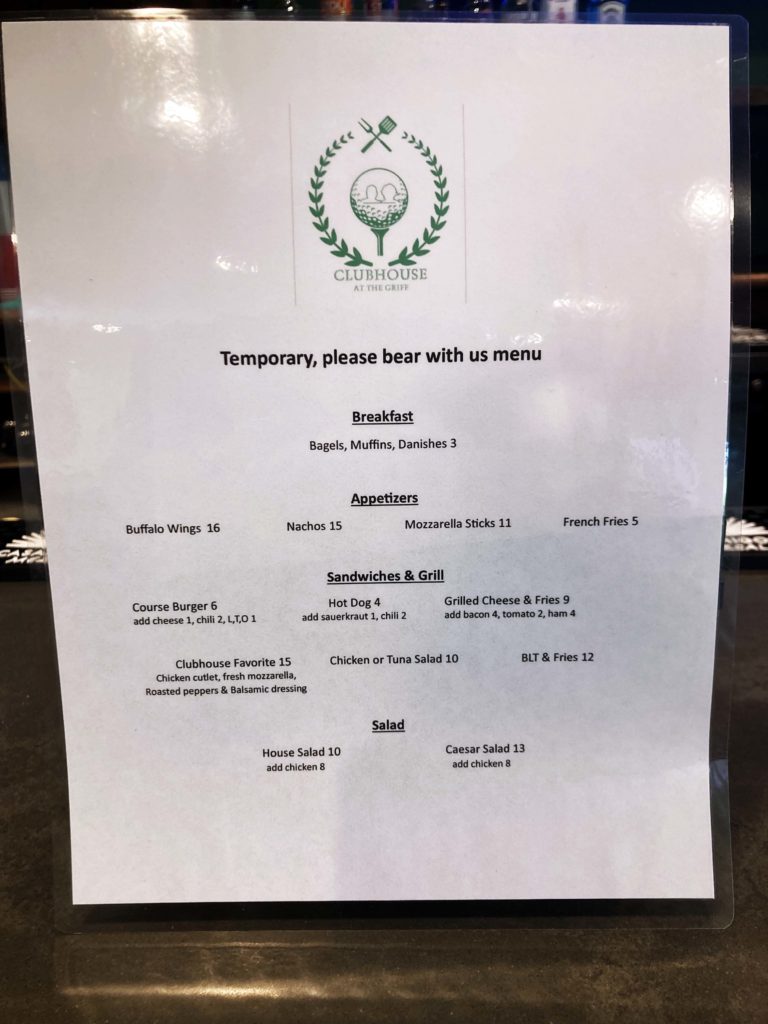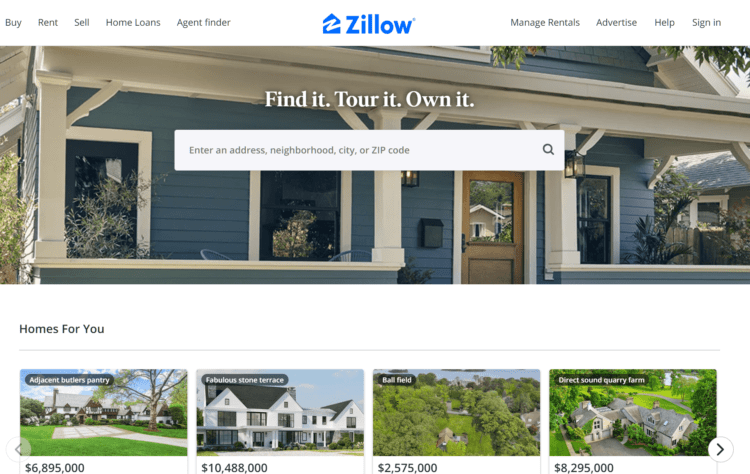
By Mark Pruner
Right now, there is a great information war going on on the Internet over real estate information and some of the sites are creating “alternative” information though often without the agendas that we see in the political arena. If you go out looking for information about your home or a home that you are interested in, you need to be careful that the “facts” you are getting are actually facts. The biggest offender of this inaccurate information is the biggest real estate website Zillow. Zillow has the lion share of searches, particularly when you include Trulia which they purchased a couple of years ago.
Only the FTC is keeping Trulia alive. As part of getting the FTC’s acquiescence to Zillow buying Trulia, Zillow had to agree not to close down Trulia. Instead, what Zillow has done to let Trulia, which used to be a pretty good site with several unique features, become a distant also-ran with outdated features and the same house price estimates as Zillow. Zillow has announced four new features just in the last two months. For Trulia nothing in awhile other than an imported Zillow feature.
The battle of the big three real estate websites is now down to the big two and unfortunately the number 2, Realtor.com has become a distant number 2. Like Avis, Realtor.com is trying harder, but they are constrained by reduced cash flow. I recently talked to one of the senior officers, and he said they have big plans to gain market share, but that’s yet to be seen. However, it’s still my go to website for public real estate information.
The interesting competition to Zillow is likely to be coming from CoStar, which owns the largest commercial real estate listing site, LoopNet.com and also Apartments.com. CoStar has announced a Zillow competitor in the residential information website, but it’s taking them a while to roll out that new site.
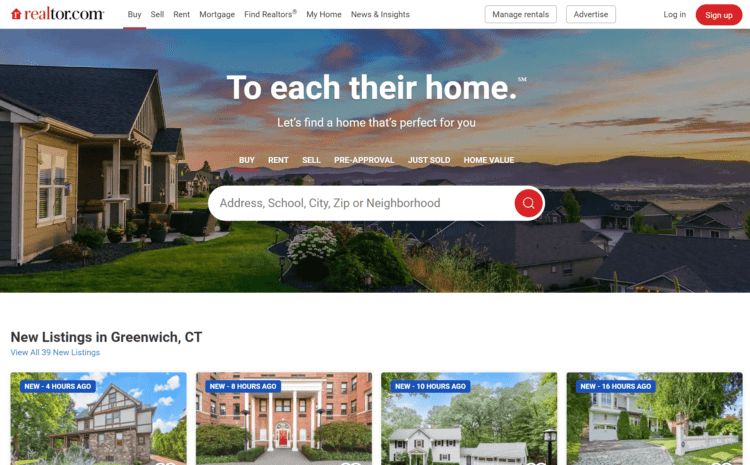
Zillow vs. Realtor.com
Realtor.com used to having a timing advantage over Zillow. Historically, new listing information from the GMLS goes directly to Realtor.com since it started out as the website of the National Association of Realtors. (The NAR then became the only trade association that I’m aware of that sold their own website to a private organization. Part of this is the way that Realtor.com was funded, from some of the brokerage firms, but not all.)
Zillow used to get their listing information from ListHub.com, which is like Realtor.com, a News Corp. company. This resulted in Zillow’s listings being hours out-of-date, which in a hot market can make a difference as to which buyers gets to see the house first. At the same time, most brokerage firms got their listing information directly from the MLS that they belonged to, just as Realtor.com did. Once again getting it faster than Zillow. For Zillow, this delay was bad news.
Zillow figuring if you can’t beat them, join them, did just that. Zillow is now a licensed broker in ever state, though they rarely do anything that looks like a traditional brokerage. Their brokers mostly just get the listing feeds form the various MLS’s and forward it immediately to Zillow.
Zillow the brokers are also looking to co-broker listings with agents so that instead of Zillow getting paid a few hundred dollars for advertising fees to produce leads, they are now going to take thousands of dollars, as a percentage of the local broker’s commission. Given Zillow’s major market influence this tying has major antitrust issues, but it’s working for them so far.
Some Zillow Data to be Beware of
I wrote an article last year pointing out that Zillow’s estimated monthly payment is often thousands of dollars higher in Greenwich than the real carrying cost as they don’t use the actual Greenwich tax amount, but a countywide average tax rate to calculate taxes. I regularly point this out to my buyers so they know they can afford more house that Zillow says.
Zillow also has as an automated valuation model to determine the value of your house, their so-called Zestimate; and it’s often wrong. To their credit they do give a Zestimate range, but then come up with one number for their estimated sales price in a much bigger font. If you look at their chart of past Zestimates it bounces all around for no apparent reason.
It looks like they give way too much weight to recent sales so that every time a house sells above or below, the Zestimate jumps. It looks dramatic but is no way to try to figure out the value of house. You’ll notice that once a property is publicly listed the Zestimate becomes the same as the list price. I guess they figure the owner and their agent know more than they do. (They do.)
Lastly, Zillow is really bad about correcting bad information. I’ve had listings where for some reason, the acreage was wrong, multiple emails and weeks later they might get around to fixing it. If a number is important to, you should have your agent check it out.
Realtor.com has multiple ATM’s
One nice feature at Realtor.com is that it has multiple sources for their estimate of your property’s value. Banks have used two major AVM’s for years; CoreLogic and Collateral Analytics and both are available at Realtor.com. In fact, Realtor.com uses CoreLogic’s estimate for their top line estimate. These traditional AVMS have recently been joined by a new kid, Quantarium, which sometimes, though not usually, may be more accurate. At least you have 3 choices. Often, the closer all three are the better the estimate.
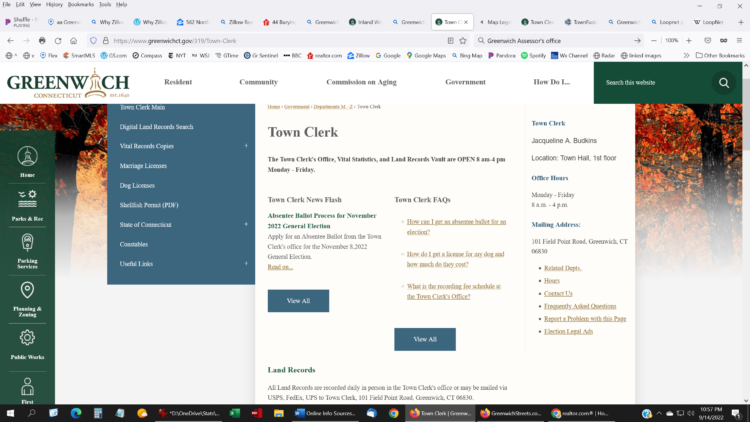
The Greenwich Assessor’s FMV
Since you are in Greenwich, you are likely to get a much better estimate of value from the Town Assessor’s estimate of the fair market value of your property. Unlike the “numbers only” AVM, the Assessor adjusts for lot size, wetlands, highway traffic and over a dozen other factors that affect property value in Greenwich. To get your copy of a property’s field card stop by the Assessor’s office on the first floor of Town Hall or you can email them using the email address on their website. Either way, their more accurate model will cost you a buck.
The Greenwich Town Clerk’s Office Land Records
The Assessor’s field card is a wealth of information. One thing you will find in the upper right corner is the date of the last sale and the book and page where the deed for that sale is filed in the Town Clerk’s records.
The great thing is that our prior and present Town Clerk’s, Carmella Budkins and Jackie Budkins, have done a great job putting this information on the Internet via Town Fusion. Head over to GreenwichCt.org. Go to the Town Clerk’s page and click on the Digital Land Records link. You’ll need to set up an account, but it’s free. Find the book and page number search and put in the numbers from Assessor’s field card. Up will come the relevant deed even if it was filed in 70 years ago.
The deed will show the official names of the buyers, the present owner. Go back to search and search each name and you’ll find mortgages, easements, liens, lawsuits and a variety of other things that can affect the value of the property.
If you are really ambitious, or a lawyer or title examiner, check out Exhibit “B” of the deed to find the book and page of prior encumbrances and the map number from when the lot was created. These are online too.
GIS, the Best Thing in the Basement of Town Hall
If you are looking for property info, head down to the basement of Town Hall. At the bottom of the main stairs in the Geographical Information Systems offer. Bring your field card with it’s address and Tax ID number and Kerry will help you get a printout of dozens of layers of information from topography, to walls, ponds and streams, wetlands, driveways, bridges and lots of useful information. Alternatively, like the land records, you can use the GIS online order form. In addition, to the GIS map you can get an aerial map, both will cost you five bucks.
One note on wetlands, those are estimated from aerial images. To really determine the boundaries of any wetlands on your property you need to check with Inland Wetlands and Watercourse Agency on the second floor of Town Hall and hope that someone has filed a previous application and had a soil scientist map the wetlands.
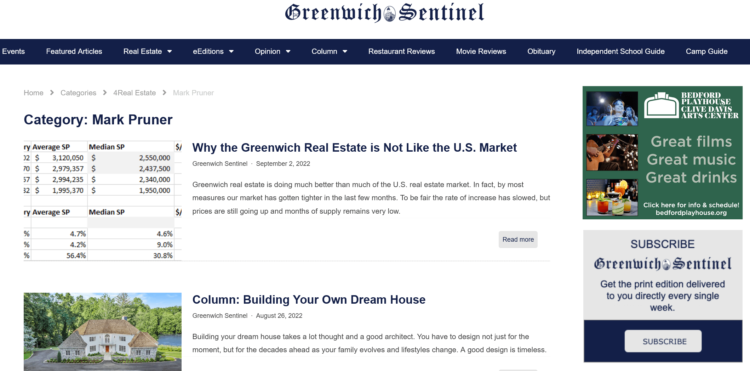
The Sentinel and GreenwichStreets
The Sentinel archives lots of my and other authors real estate articles with information on various town neighborhoods, market reports and market segments. Just go to greenwichsentinel.com and click on “Real Estate” in the top navigation. You can also find these at GreenwichStreets.com which will have a major redo next week with some cool videos and also with an archive of my articles back to 2018. (Back to be added 2013 to be added.) We also have podcasts of our Monday morning show on WGCH.
Brokerage Websites Market Reports
All of the major firms produce very good market reports usually on a monthly basis. These reports usually have year-to-date information as well as the current months information broken down by neighborhood. Check in with your favorite agent and they will gladly arrange to put you on a mailing list. (I send out about 220 of these each week along with my open house list.)
One thing to note is that in Greenwich, these reports can be affected by the law of small numbers. This law says that when you slice a data set several different ways, the remaining small set of data numbers will jump around a lot from period to period. For example, the inventory in Banksville saw a 50% this year over last year. This is impressive especially when you note that at the same time, the town wide inventory went down 24%. The real story, the 50% jump in Banksville is because last year we had two listings in Banksville and this year we have three listings.
We have many other sources for real estate info, but you really should make your Realtor get the info for you. 🙂
Mark Pruner is realtor with Compass. He can be reached at 203-969-7900 or mark.pruner@compass.com.

